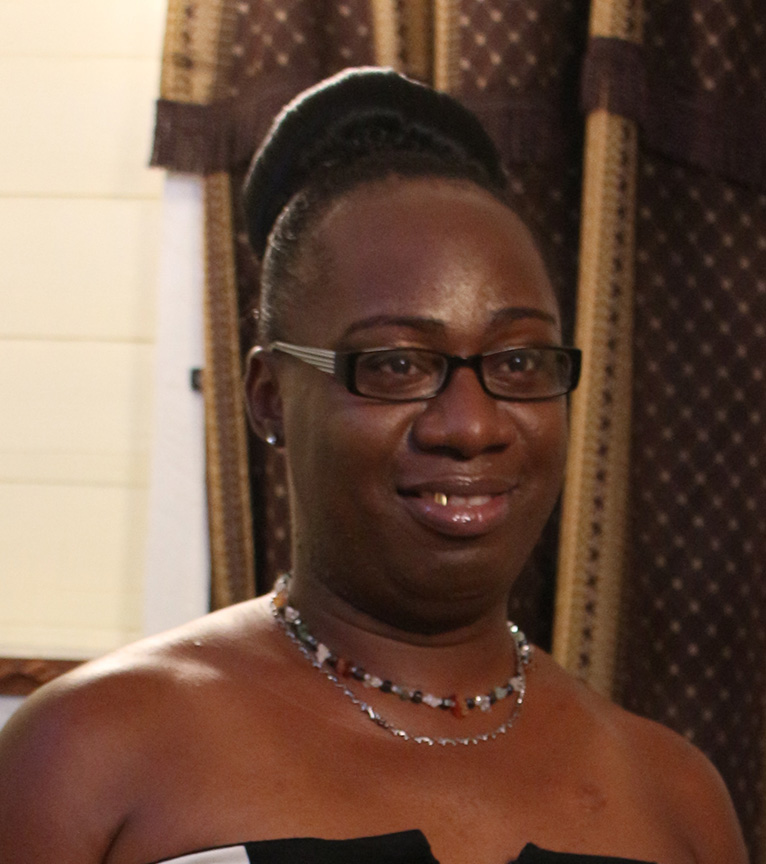Angel (Seon) Fraser is a litigant in the challenge to the cross-dressing law of Guyana. Rae Wiltshire is an award-winning playwright, theatre director and short story writer. His play “Creative Burial Ground” and short story, “Me Fuss Fineral” placed first and second respectively at the Guyana Annual Competition 2018. He is currently in his final year at the University of Guyana, studying Literature and Linguistics.

Angel has been working in catering for 20 years. It’s a skill she learnt by observing her mother in the kitchen. She nurtured it, turned her talent into a business and now dreams of owning a five-star restaurant. She believes that all trans persons should strive to attain economic independence and not depend on someone: “As my father always say, ‘It is better to teach a man to fish, than to give him a fish’. Trans persons should seek employment. Even though it is difficult, they should never give up. If you knock on 100 doors, one must open. It is better to climb five steps and fall back two than to not climb at all.”
For Angel, when someone gives you sustenance you do not give it value, but when you work for your own sustenance you do. Her values and strength to survive come from her family’s love. “My family accepts me fully for who I am,” she said. “If you can’t get love from your family, you ain’t gon’ get it from nowhere else. The worst part of being gay/trans is being rejected by your own family.”
Angel knew she was different from the age of four. She would often play dolly house while her brothers played sports. Yet despite her inclination for non-traditional gender roles, her siblings and other family members did not shun her. She recounted an aunt saying, “Despite who you are, despite what you may do, despite who you is, I will always love you. You are a Clarke and I am a Clarke.” It is one of her happiest memories of love and affection.
Angel’s dad also played a critical role in her acceptance. She described him as a strict and serious man, who the neighbourhood respected and feared. He was a former boxer and Angel believes that because of the respect her dad commanded, she was not harassed as a child. In fact, her neighbours embraced her fully when she appeared on a talk show in female clothing, many of them calling the show to declare their support. After expressing her gender identity she felt more welcomed into the community.
Angel’s dad was one of her biggest supporters and would even zip up her dress when she was getting ready to go out. He was her favourite person, despite the fact that they often had conflict between them. The majority of the issues came when Angel entered an abusive relationship. She said her father detested her former lover and hated the marrow in his bone for abusing her. The relationship left indelible marks on her skin – marks which Angel said do not affect her. “I have recovered from the abuse. I don’t let things affect me emotionally. I don’t like taking people and making them an enemy,” she said.
Fortunately for her, the man is now serving a life sentence in jail for murder. She remembered him saying, “I love you to death and if me and you have to lef’, one of us will have to die.” She describes the violence she experienced as a lesson for her, and now she is able to give her own advice to persons who suffer from domestic violence. “It is never too late to get out,” she said. “From the time you allowed that person to hit you once, it will happen again. I would advise persons to get far away. Not only trans persons, but women too. If you can get out, run as fast as you can. Once there is life there is hope.”
A second chance
Angel feels lucky to be alive. One of her worst memories is when she was attacked by four gunmen, who stole her car. One of the men lashed her in her head with a piece of wood and she was then gun-butted on the road. One of the bandits then stood over her and cranked his gun – but decided not to shoot. Today, Angel uses her second chance at life to fight for transgender rights. She was arrested with six other transgender persons for cross-dressing in 2009. In 2010, Angel and three of the others who were arrested – Gulliver (Quincy) McEwan, Pheches (Joseph) Fraser and Isabella (Seyon) Persaud – with the support of the Society Against Sexual Orientation Discrimination (SASOD), put forward a constitutional claim that the law prohibiting cross-dressing was inconsistent with the Guyana Constitution (1980).
They argued that the Summary Jurisdiction (Offences) Act – which uses terms such as “improper purpose”, “male attire” and “female attire” – is vague and fails to give “the person of ordinary intelligence a reasonable opportunity to know what is prohibited”, as laws should do. The litigants argued that the Act violated their right to freedom of expression, since clothing is a form of expression, as well as the constitutional guarantee of non-discrimination and equality before the law. In 2013, then-Chief Justice Ian Chang ruled that trans persons have a right to express their identity – as long as it is not for an improper purpose. Angel said since that ruling, harassment from police is less frequent. The litigants filed an appeal.
In 2017, the Court of Appeal dismissed the appeal, rejecting the appellants’ arguments that the law in question was uncertain and violated the equality provisions in the Constitution. On June 28, 2018, they appealed the case again at the Caribbean Court of Justice (CCJ). Angel said she believes the ruling will be favourable because the lawyers presented a strong case. She said a positive result will be good for the entire LGBT community, and hopes Guyana will be a better place for LGBT people who would like to come out and be more free and comfortable with themselves.
In the spotlight
One place where Angel feels free is on a pageant stage. “On stage it feels like [trans women] against the world,” she said. She explained that pageantry empowers her and makes her feel comfortable in her own skin. She has won three pageants: Miss Gay Glory in 2001, Miss Leopold Pageant in 2013, and Miss Queen of Queens in 2015. Winning pageant contests is one of her dreams that came true. She said she would have liked to become a lawyer or a pilot but was unable to do so because of finances. However, she added, such dreams are not out of reach – “Where there is life, there is hope” she said, a mantra which she continuously repeated throughout the interview.
She would like to see the LGBT community in Guyana embrace this positive attitude: “Trans persons should believe in themselves, believe in their dreams and pursue them. Unite, love one another and uphold your belief. Don’t let anybody tell you that you not worth anything.” One of her greatest dreams is to see gay and straight people living as one in Guyana – and that when death comes knocking on her door, God will tell her, “You are accepted.”

